After reading a few of the speeches given by a Seneca leader, I can see why his people began calling him Sagoyewatha (1750-1830) which translates to “He Keeps Them Awake” referring to his oratory skills. Earlier in life he was known as Otetiani (Always Ready), but by 1780, after speaking out for his people many times the name Sagoyewatha stuck. He had another name, too, given to him by American Patriots during the American Revolution. They called this Seneca leader Red Jacket due to the embroidered red coat the British gave him that he wore in battle during the American Revolution.
During the war the Six Nations/Iroquois League to which the Seneca belonged were divided. Some fought with the Patriots while others, like Red Jacket, fought on the side of the British hoping that if they won, the British would keep the white settlers from taking their land.
Following the war Red Jacket and around fifty other Native American leaders from the Six Nations visited Philadelphia in 1792 which at that time served as the capital city for the United States. The purpose of the meeting was to meet with President George Washington and negotiate treaties that they hoped would help them hold onto their lands. While in the nation’s capital, the Indian leaders were treated as rules of foreign nations which they were. U.S. House Speaker, Jonathan Trumbull, Jr., took the group on a tour of Philadelphia.
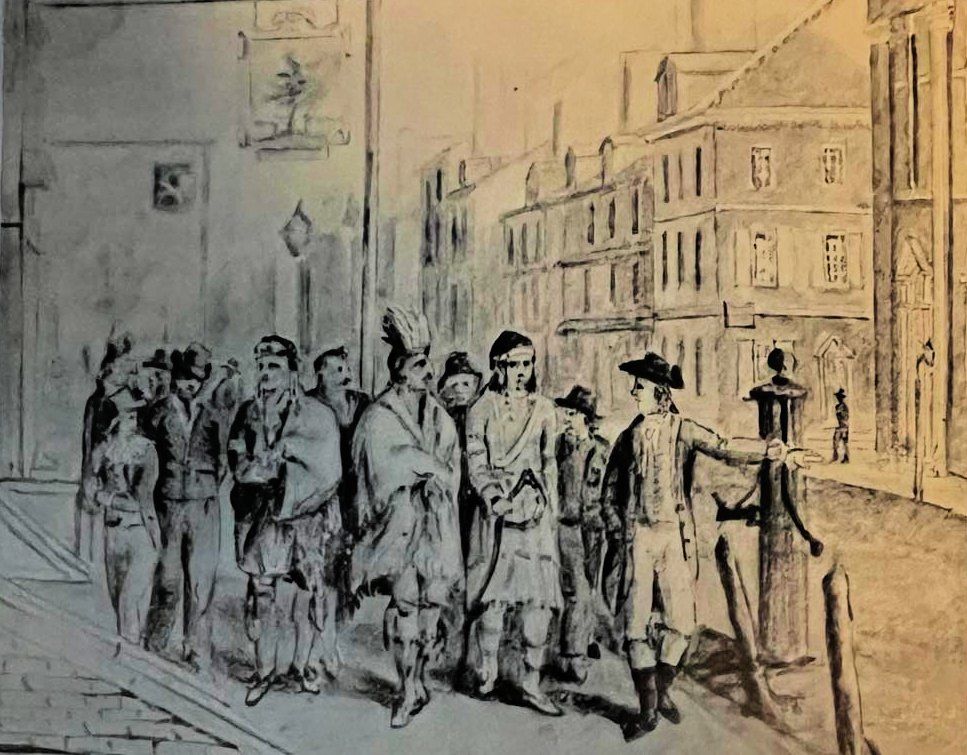
During the meeting at Philadelphia President Washington gave each man a silver peace medal which was engraved with an image of President Washington shaking Red Jacket’s hand. Afterwards Red Jacket wore the medal in every portrait that was painted of him.
Today, the medal can be seen at the Seneca-Iroquois National Museum.
This painting by Charles Bird King is just one of a few showing Red Jacket wearing the peace medal.
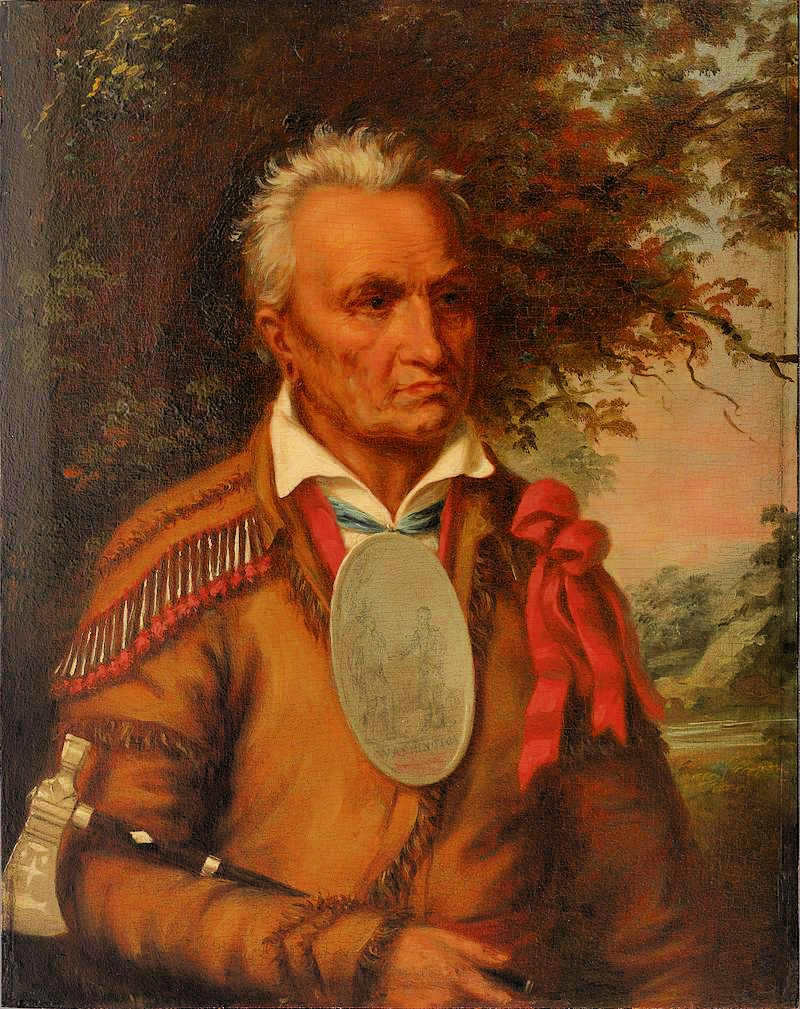
During the meeting Indian leaders presented presents of their own and demonstrated various dances important to their tribes. Finally Red Jacket spoke saying, “We first knew you were a feeble plant which wanted a little earth whereupon to grow. We gave it to you; and after, when we could have trod you under our feet, we watered and protected you; and now you have grown to be a mighty tree, whose top reaches the clouds, and whose branches overspread the whole land, whilst we, who were the tall pine of the forest, have become a feeble plant and need your protection.”
Unfortunately, that did not happen. Red Jacket had very few options and was forced to sign the Treaty of Canandaigua in 1794 which gave most of the Seneca’s land to the United States. Some of the Seneca land was retained in New York state, but by this time most of the tribe had migrated to Canada. Many of their descendants today live on the Six Nations Reserve in Ontario.
By 1805, Christian missionaries from Boston including Jacob Cram were visiting the Seneca natives in New York state to convert them to Christianity. At the meeting between the two groups Red Jacket and the others listened to the missionaries politely. When Red Jacket finally spoke, it was reported that his voice was strong as he basically put the missionaries in their place.
Red Jacket began by recounting some history saying, “Friends and Brothers…This council fire was kindled by you. It was at your request that we came together at this time. We have listened with attention to what you have said…Brothers…listen to what we say, There was a time when our forefathers owned this great island…from the rising sun to the setting sun. The Great Spirit had made it for the use of the Indians. He had created the buffalo, the deer, and other animals for food. He had made the bear and the beaver. Their skins served us for clothing. He had scattered them over the country and taught us how to take them. He had caused the earth to produce corn for bread. All this He had done for his red children because He loved them…
Notice that Red Jacket refers to his forefathers owning “this great island.” The Iroquois name for North America was “Turtle Island,” which is why Red Jacket used the reference.
Red Jacket continued, “But an evil day came upon us. Your forefathers crossed the great water and landed on this island. Their numbers were small. They found friends and not enemies. They told us they had fled from their own country for fear of wicked men and had come here to enjoy their religion…We took pity on them…and they sat down amongst us…
The white people, brother, had now found our country. Tidings were carried back and more came amongst us. Yet we did not fear them. We took them to be friends. They called us brothers. We believed them…At length their numbers had greatly increased. They wanted more land; they wanted our country. Our eyes were opened, and our minds became uneasy. Wars took place, Indians were hired to fight against Indians, and many of our people were destroyed. They also brought strong liquor amongst us. It was strong and powerful and has slain thousands.”
Then Red Jacket began to discuss the present and mission of the missionaries saying, “Brothers, our seats were once large and yours were small. You have now become a great people, and we have scarcely a place left to spread our blankets. You have got our country but are not satisfied; you want to force your religion upon us…
Brothers, continue to listen. You say there is but one way to worship and serve the Great Spirit. If there is but one religion, why do you white people differ so much about it?…
Brothers, we…also have a religion which was given to our forefathers and has been handed down to us, their children…
Brothers, we do not wish to destroy your religion or take it from you. We only want to enjoy our own…
Brothers, we have been told that you have been preaching to the white people in this place. These people are our neighbors. We are acquainted with them. We will wait a little while and see what effect your preaching has upon them. If we find it does them good, makes them honest and less disposed to cheat Indians, we will then consider again of what you have said.”
A few years later, during the War of 1812 Red Jacket took the side of the United States against the British. During the Battle of Chippewa in July 1814 Red Jacket and his men took part helping the American’s win the battle. On the battlefield Red Jacket and his men wore white-hankie hats so that the American forces could tell the difference between the Native Americans fighting for the British and the pro-American Seneca men during the heat of battle. The battle ended in a victory for the United States, and the Seneca men including Red Jacket did not leave the battlefield until they had taken the scalps from the ninety dead bodies of British, Canadian, and mohawks that lay on the field.
As he grew older, Red Jacket had issues with alcohol and lost many family members due to illness. At one point he said of himself, “Red Jacket was once a great man, and in favor of the Great Spirit. He was a lofty pine among the smaller trees of the forest. But after years of glory, he degraded himself by drinking the firewater of the white man. The Great Spirit has looked upon him in anger and his lightning has stripped the pine if its branches.”
Red Jacket continued to stand in defense of his religion and continued to oppose attempts to convert his people to Christianity. In 1827 he visited Washington, D.C. to discuss his concern that many of his people were converting to Christianity with the Secretary of War at the time, James Barbour, and Thomas L. McKenney, head of the Bureau of Indian Affairs. They told Red Jacket to return home and allow his people to make their own choices.
Red Jacket died in a tribal village near Buffalo, New York on January 20, 1830, and is buried at the Forest Lawn Cemetery. In a bit of irony, it is noted on his Find-A-Grave page that “his wife had a Christian funeral service for him, something he would never have approved.
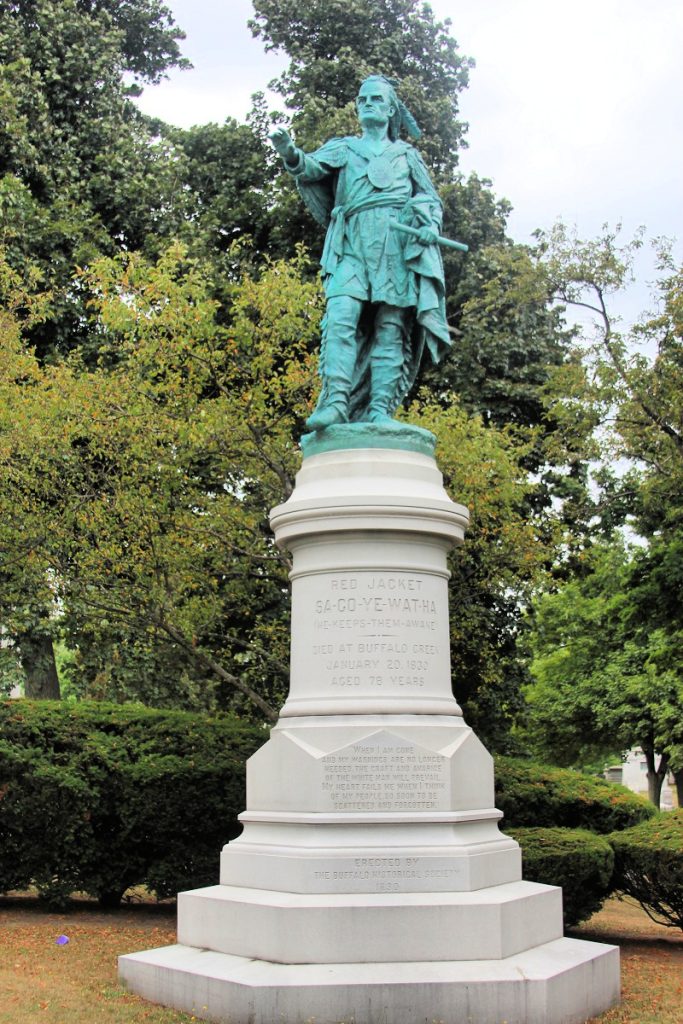
This monument stands at Red Jacket’s grave. It is engraved with this final word from Red Jacket that says, “When I am gone and my warnings are no longer heeded, the graft and avarice of the white man will prevail. My heart fails me when I think of my people so soon to be scattered and forgotten.”
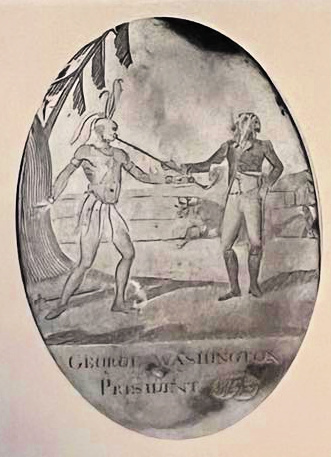
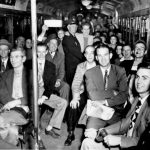
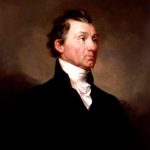
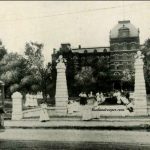
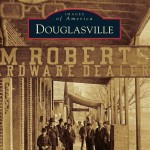
Leave a Reply